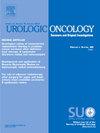创新的 3D 方法通过计算肾肿瘤的真实接触面来预测手术效果。
IF 2.4
3区 医学
Q3 ONCOLOGY
Urologic Oncology-seminars and Original Investigations
Pub Date : 2025-03-01
DOI:10.1016/j.urolonc.2024.10.021
引用次数: 0
摘要
目的:接触表面积(CSA)是围手术期参数的预测指标,代表肿瘤与器官之间的接触面积。目前尚未找到计算 CSA 的精确方法。我们测试了一种新的 CSA 计算方法,作为机器人辅助肾部分切除术(RAPN)术中参数的预测指标:研究对象包括在一家欧洲大医院接受 RAPN 治疗的所有连续患者(2020 年至 2023 年;82 名患者)。我们提出了一种测量 CSA 真实值的新方法,该方法使用的算法利用了从三维重建中获得的肾脏和肿瘤的几何形状。这些重建是通过认证软件 Materialized Mimics InPrint 获得的。患者的围手术期参数记录在匿名数据库中。我们利用斯皮尔曼相关性研究了真实 CSA(RCSA)、谢氏 CSA(HCSA)、PADUA 和 R.E.N.A.L. 评分与围手术期参数之间的相关性。此外,我们还使用接收者操作特征曲线(ROC)分析法研究了 RCSA、PADUA 和 R.E.N.A.L. 评分中哪一个能更好地描述术中参数、暖缺血时间(WIT)、手术时间(OT)和估计失血量(EBL)。进行了多变量线性回归分析:78名患者接受了前瞻性治疗。我们观察到 RCSA 与 WIT(P < 0.001)、OT(P < 0.001)和 EBL(P < 0.001)之间存在明显相关性。此外,ROC 曲线分析表明,RCSA 优于 PADUA 和 R.E.N.A.L.评分。在 ROC 分析中,为每个参数选择了一个阈值:WIT 20 分钟、OT 180 分钟和 EBL 200 毫升。在多变量回归分析中,RCSA 成为 WIT(P = 0.002)、OT(P = 0.01)和 EBL(P < 0.001)的唯一独立预测因子:结论:我们独创的三维 RCSA 计算方法与术中手术结果相关。结论:我们独创的三维 RCSA 计算方法与术中手术结果相关,与 PADUA 和 RENAL 评分相比,我们计算出的 RCSA 更能可靠地预测术中参数。本文章由计算机程序翻译,如有差异,请以英文原文为准。
Innovative 3D method predicts surgery outcomes by calculating real contact surface of renal tumor
Objective
The Contact Surface Area (CSA) is a predictor for peri-operative parameters and represents the contact area between the tumor and the organ. A precise method for calculating CSA is yet to be found. We tested a new CSA calculation method as a predictor of intra-operative parameters in robot assisted partial nephrectomy (RAPN).
Materials & Methods
The study population consisted of all consecutive patients treated with RAPN at a single high-volume European institution (between 2020 to 2023; 82 patients). We proposed a new method to measure the real value of CSA using an algorithm that leverages the geometry of kidneys and tumors obtained from 3D reconstruction. These reconstructions were obtained using the certified software Materialized Mimics InPrint. The peri-operative parameters of patients were recorded in an anonymous database. We explored the correlation between real CSA (RCSA), CSA of Hsieh (HCSA), PADUA and R.E.N.A.L. scores with peri-operative parameters using Spearman's correlation. Furthermore, we examined which of RCSA, PADUA and R.E.N.A.L. score better describes the intra-operative parameters, Warm Ischemia Time (WIT), Operating Time (OT), and Estimated Blood Loss (EBL) using Receiver Operating Characteristic (ROC) curve analysis. Multivariable linear regression analyses were performed.
Results
Seventy-eight patients were prospectively enrolled. We observed a significant correlation between RCSA and WIT (P < 0.001), OT (P < 0.001) and EBL (P < 0.001). Moreover, RCSA outperformed both the PADUA and R.E.N.A.L. score as demonstrated in the ROC curve analysis. In ROC analysis was chosen a threshold for each of the parameters: for WIT 20 minutes, for OT 180 minutes and for EBL 200 mL. At multivariable regression analysis, RCSA emerged as the only independent predictor for WIT (P = 0.002), OT (P = 0.01) and EBL (P < 0.001).
Conclusions
Our original 3D RCSA calculation method was associated to intra-operative surgical outcomes. As compared to PADUA and RENAL score, our calculated RCSA represented a more reliable predictor of intra-operative parameters.
求助全文
通过发布文献求助,成功后即可免费获取论文全文。
去求助
来源期刊
CiteScore
4.80
自引率
3.70%
发文量
297
审稿时长
7.6 weeks
期刊介绍:
Urologic Oncology: Seminars and Original Investigations is the official journal of the Society of Urologic Oncology. The journal publishes practical, timely, and relevant clinical and basic science research articles which address any aspect of urologic oncology. Each issue comprises original research, news and topics, survey articles providing short commentaries on other important articles in the urologic oncology literature, and reviews including an in-depth Seminar examining a specific clinical dilemma. The journal periodically publishes supplement issues devoted to areas of current interest to the urologic oncology community. Articles published are of interest to researchers and the clinicians involved in the practice of urologic oncology including urologists, oncologists, and radiologists.

 求助内容:
求助内容: 应助结果提醒方式:
应助结果提醒方式:


